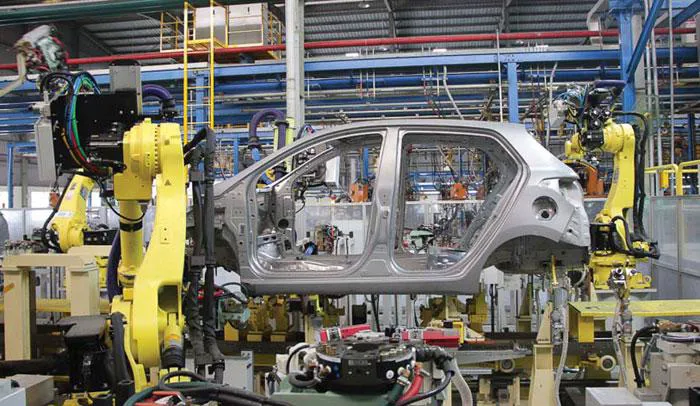Companies from China and India temped to move to Vietnam
Vietnam’s skilled workforce, optimistic economic outlook, and competitive wage prices are among the factors drawing foreign investors’ attention to the country.
An estimated 21% of Indian companies that have operations in Southeast Asia or expect to do so in the future show their plan to expand their businesses in Vietnam in the next two years. Whilst, 26% of Chinese corporates in Vietnam are looking to prioritize growth here over the next two years.
| Car production at Thanh Cong Hyundai Plant. Photo: Viet Dung |
These are some of the key findings from HSBC Navigator: SEA in Focus, which surveyed more than 1,500 companies from six of the largest economies in the world, including China, France, Germany, India, the UK, and the US – all of which have operations in Southeast Asia or have plans to do so in the future. The survey gauges their sentiment on doing business in Southeast Asia, with a particular focus on trade, digitization, and sustainability.
“Vietnam is a strong example of how to initially contain Covid-19 and then rapidly roll out vaccines which have enabled the country to reopen and it's economy to recover at pace. Embracing strong economic fundamentals together with taking advantage of being one of the most attractive investment destinations, Vietnam is back to rapidly growing as one of the newer manufacturing hubs in the world,” said Tim Evans, CEO of HSBC Vietnam.
“An enviable position that has been achieved due to favorable policies by the Government, especially around free trade agreements. Through HSBC Vietnam’s discussions with our international corporate clients, we believe that the trend of more global companies moving to Vietnam is not temporary but is much longer-term and very strategic,” he added.
Opportunities driven by Vietnam’s advantages
On the advantages side, 3 out of 10 surveyed companies found Vietnam’s skilled workforce to be the most attractive feature of the market, while 27% of respondents were attracted by the country’s optimistic economic outlook, competitive wage prices, and the resilience demonstrated by Vietnam during the pandemic. 39% of Indian companies favored the market thanks to developed infrastructure and 49% favored Vietnam's supportive government and regulatory environment. 36% of US companies were very attracted by the opportunity Vietnam affords to test and develop new products/solutions.
In parallel, up to 49% of the survey’s participants, especially those from China, India, and the US, intend on taking advantage of EUVFTA (EU-Vietnam Free Trade Agreement) to increase and support their trade with the region, among other FTAs including CPTPP, RCEP, EUSFTA (EU-Singapore Free Trade Agreement).
On the opposite, 33% of surveyed companies found that they faced challenges in supply due to the pandemic’s impacts when doing business in Vietnam. Cultural issues, including language constraints and business conducting, were also a major concern. 31% pointed to these as a particular challenge for them in Vietnam.
Sustainability considerations
As one of the hot topics in the world nowadays, sustainability in Vietnam is also carefully considered by international investors that have operations here.
Vietnam is a regional leader in its progress toward achieving the 17 UN Sustainable Development Goals (SDG). Ranked 51st of 162 countries by the SDG Index, it is thus rated as having greater success than all other Southeast Asian countries barring Thailand.
In addition, 45% of companies operating in Vietnam stated that the most important sustainability actions they could take were improving energy efficiency; a further 42% underlined the importance of supporting local communities.
On the other hand, some 31% of respondent companies operating in Vietnam worried that new regulations and rules on carbon reduction could impact them. It is therefore unsurprising that to achieve their sustainability goals, 3 in 10 of those international firms pointed to a need for further improvement in their internal sustainability expertise, while 36% flagged the difficulty of hiring employees who possessed the correct sustainability capability.
“As one of the rising stars in Asia, Vietnam is well-positioned to benefit from the business opportunities that are coming it's way. Sustainability and the transition to net-zero are particular areas where opportunities will open up following Vietnam’s ambitious commitments made at COP26,” Tim said.
“There is a clear desire by the country to continue to be an attractive investment destination while also working towards becoming a ‘greener and cleaner’ location to be based,” he suggested.
During the first four months of 2022, Vietnam attracted an FDI of over US$10.8 billion or 88.3% of the amount recorded in the same period of last year. The country saw a surge of 92.5% and 74% year-on-year respectively for investment capital injected into existing projects to $5.3 billion, and capital contributions and share purchases to $1.83 billion. Singapore remained Vietnam’s largest investor during the four months with $3.1 billion, or 28.8% of the total, followed by South Korea at $1.82 billion, and Denmark in third with $1.3 billion. |












